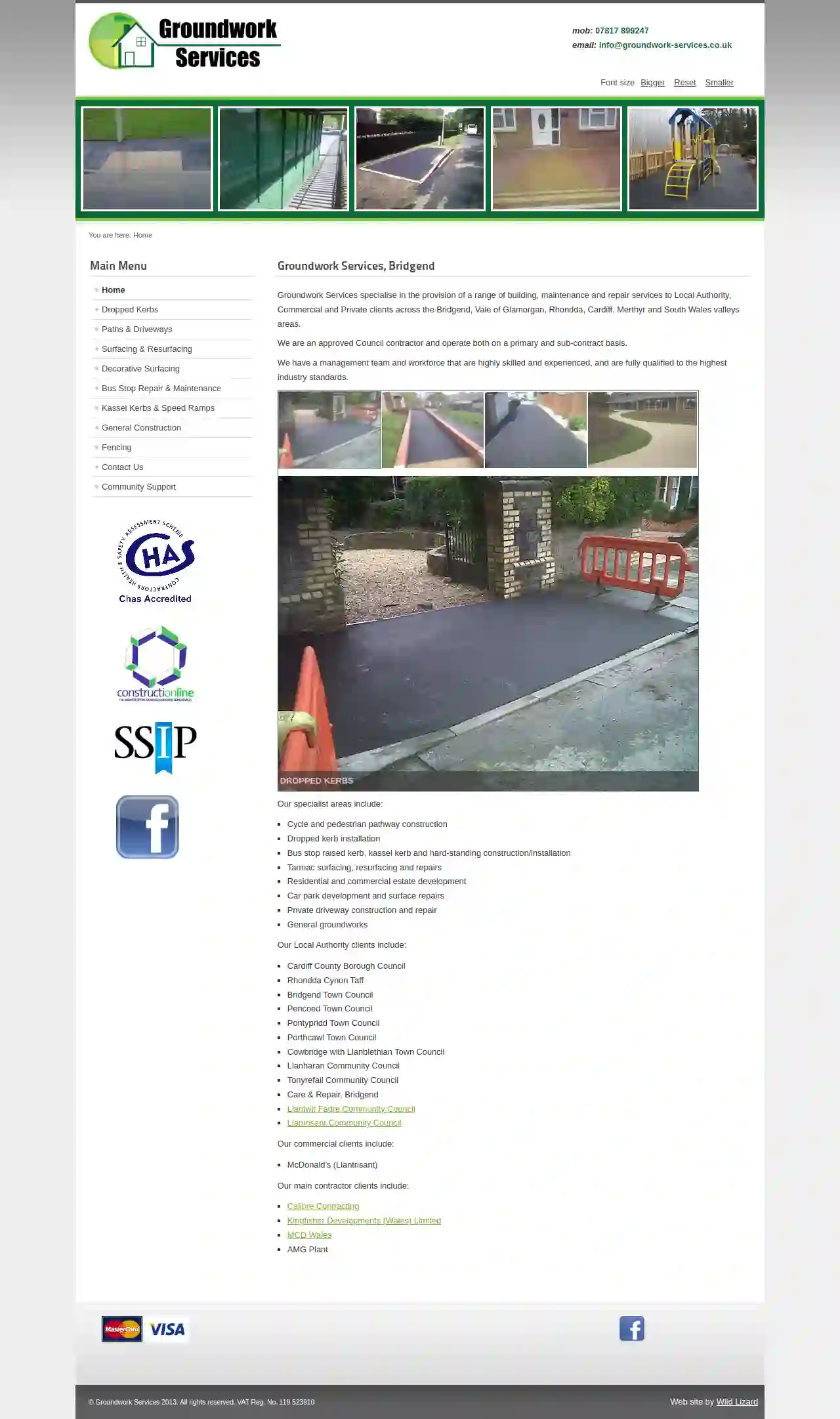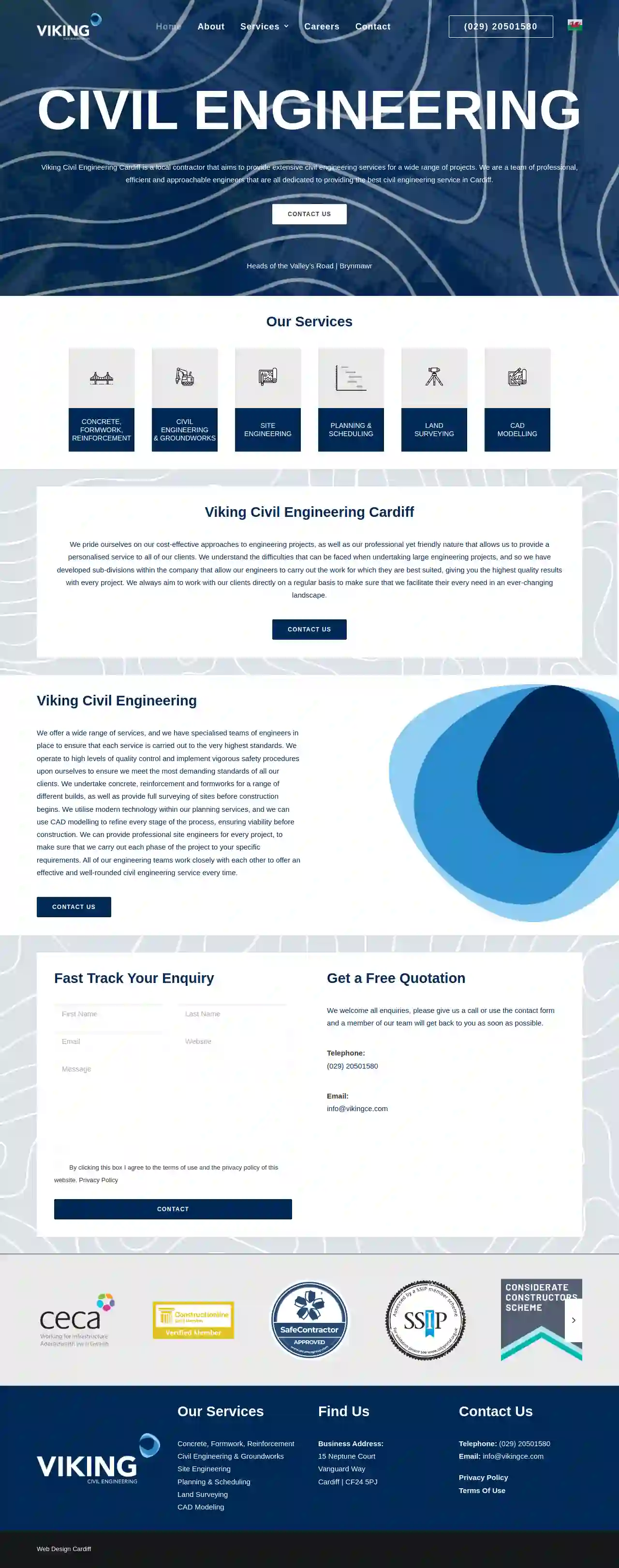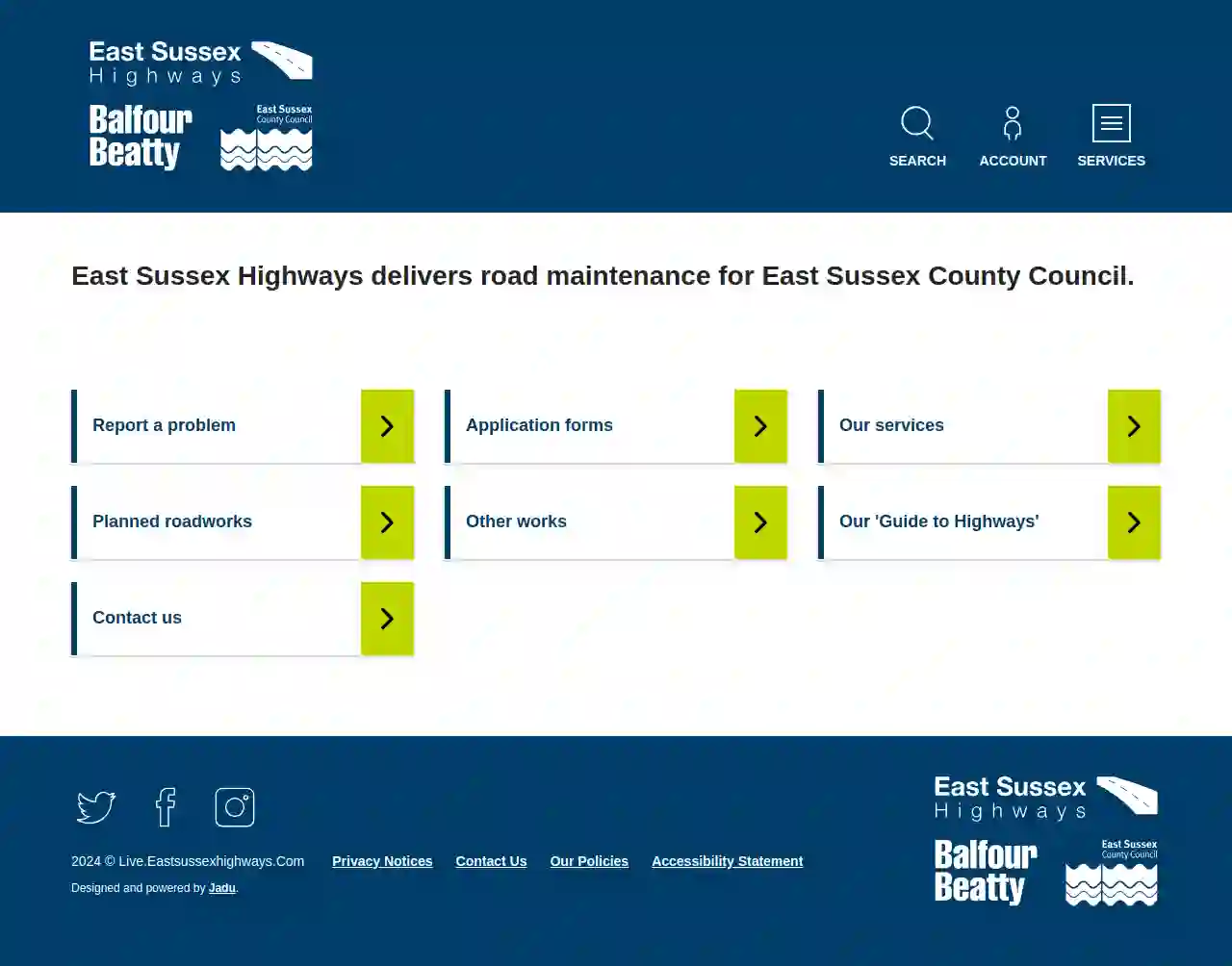Excavation Contractors Barton under Needwood
Top 10 Excavation Contractors in Barton under Needwood
Get up to 3 Excavation Contractors quotes for your project today! Compare profiles, reviews, accreditations, portfolio, etc... and choose the best service.

Groundwork Services
44 reviews89 Old Field Road, Bridgend, CF35 5LJ, GBGroundwork Services, Bridgend Groundwork Services specialize in providing a range of building, maintenance, and repair services to Local Authority, Commercial, and Private clients across the Bridgend, Vale of Glamorgan, Rhondda, Cardiff, Merthyr, and South Wales valleys areas. We are an approved Council contractor and operate both on a primary and sub-contract basis. We have a management team and workforce that are highly skilled and experienced, and are fully qualified to the highest industry standards. Our specialist areas include: Cycle and pedestrian pathway construction Dropped kerb installation Bus stop raised kerb, kassel kerb, and hard-standing construction/installation Tarmac surfacing, resurfacing, and repairs Residential and commercial estate development Car park development and surface repairs Private driveway construction and repair General groundworks Our Local Authority clients include: Cardiff County Borough Council Rhondda Cynon Taff Bridgend Town Council Pencoed Town Council Pontypridd Town Council Porthcawl Town Council Cowbridge with Llanblethian Town Council Llanharan Community Council Tonyrefail Community Council Care & Repair, Bridgend Llantwit Fadre Community Council Llantrisant Community Council Our commercial clients include: McDonald's (Llantrisant) Our main contractor clients include: Calibre Contracting Kingfisher Developments (Wales) Limited MCD Wales AMG Plant
- Services
- Why Us?
- Gallery
Get Quote
Addpost Ltd. Groundworks & Civil Engineering Contractors.
53 reviewsStoke-On-Trent, GBAddpost Ltd: Your Trusted Groundworks and Civil Engineering Partner Addpost Ltd is a well-established and reputable groundworks and civil engineering contractor based in Stoke-on-Trent, Staffordshire. We have a proven track record of delivering high-quality projects on time and within budget. Our team of experienced professionals is dedicated to providing our clients with the best possible service. We are committed to safety, quality, and customer satisfaction. We offer a wide range of services to meet the needs of our clients, including: • Groundworks • Civil Engineering • Concrete Structures • Drainage & Water Management • Earthworks • Foundations • Ground Retention We are proud to serve clients in Stoke-on-Trent, Staffordshire, Cheshire, and the surrounding areas. We are committed to providing our clients with the highest level of service and workmanship. Contact us today to discuss your project needs.
- Services
- Why Us?
- Gallery
Get Quote
S&S Drainage Ltd
553 reviews23 Hughes way, Uckfield, East Sussex, TN22 1DX, England, United Kingdom, GBAbout Us At S&S Drainage we are committed to providing a high quality and efficient services. Drain Unblocking Blocked drains. Pipework descaling and drain cleaning. Jet Wash and area cleaning. Electromechanical Cleaning Drain Cleaning We use a variety of cleaning equipment to suite the needs of the task at-hand. Wether it be blocked sink pipework or your main drains overflowing we have a tool for the job, using hand held rotary machines or portable Picote machines to unblock and clean your drains. Pre Plan Maintenance Here at S&S we use the latest in Jetting Equipment compliant with all ULEZ Standards. CCTV Drain Surveys We provide High Quality HD video recordings and a report of the condition of the pipework with standards-compliant inspection data. Using the latest Wincan Inspection software. We give you a bullet proof report with nothing but the facts. Drain Inspection Lining and Patch Lining Drain Lining When Excavation is not a option or you want to save time and money fixing your drains? We can install repairs inside the pipework to save digging up your property. Contact us to discus how we can help you with your issue today. Pipework Excavation and Installation Excavations High Pressure Water Jetting Drain collapse? Pipework displacement? New Soakaway? Sometimes there is just no choice but to dig in the ground. With our experience we will get you up and running in no time. Our services tailored to cater for all of our customers needs.
- Services
- Why Us?
- Gallery
Get Quote
Fencing Pembrokeshire - Sandy's Landscapers
Stone, GBWelcome We offer a complete service of design and construction, covering all types of hard and soft landscaping projects for private and commercial customers throughout west wales. We work hard to incorporate your ideas, and provide a detailed, hand-drawn plan which will give you a visual impression of the completed scheme together a specification breakdown of the project for your approval. Once approved, our team of experienced and knowledgeable landscapers undertake all work on the project from start to its completion. We Pride ourselves on our friendly, reliable service and ensure that once a project is started that it is completed to schedule, and that our high safety standards are adhered to at all times. Our business is built on recommendations from our customers, who have enjoyed our personal service and the attention to detail we strive to maintain. Please feel free to call us to discuss your requirements, and we will happily arrange to visit some of our completed projects in the areas to give you a flavour of our creative design and high standards of workmanship. About Sandy’s Landscapes When it comes to garden landscaping in Pembrokeshire we have the experience you need. Our extensive knowledge of plants and foliage is at your disposal. We have a reliable team of expert designers. Our prices are fair, and our services are excellent.
- Services
- Why Us?
- Gallery
Get Quote
Platinum driveways
4.928 reviews49 Station Rd, Polegate, 49 Station Rd Polegate, BN26 6EA, GBDRIVEWAY SPECIALISTS Imprinted Concrete, Block Paving, Resin Bound Stone, Tarmac, Garden Paths & Patios After all your inspiration, planning and investment, finding the right installer is essential, as you will rely on their advice, product knowledge and workmanship to achieve the desired end result. The Marshalls Register of Accredited Landscape Contractors and Driveway Installers is a national network of recommended professionals. Although they are not employed by Marshalls, they agree to abide by our own installation guidelines and are all vetted by Marshalls assessors Marshalls recognises the vital part the installer plays in the correct installation of our products. They have set up a Register of Accredited Contractors and Driveway Installers to ensure that customers buying their products enjoy peace of mind combined with the guarantee of a quality end product finished to the highest standards.
- Services
- Why Us?
- Gallery
Get Quote
RW Construction Ltd
Luttrell House, 61 Victoria Park, Luttrell House61 Victoria ParkColwyn BayConwy, Colwyn Bay, LL29 7AJ, GBRW Construction - A company you can trust... RW Construction is the construction arm of RW Masonry services. With many years experience in the construction field, we have become established as a quality provider of building services to our clients across North Wales and Anglesey, we are a long standing business with a client base consisting of experienced contractors and we want to continue to build on the excellent reputation we have worked hard to develop throughout the construction services industry. We are confident that you will be more than happy with services provided by our experienced team. Our construction services across North Wales vary. Some of the services most used are; building houses, house extensions, roofing and groundwork. As well as all of that, we also offer full project management throughout the construction phase so you can rest assured you’re in good hands. Get in touch with one of our friendly team today and chat to us about your hopes with your construction projects. Clients Across North Wales RW Construction Services have gained an impressive reputation with our clients in North Wales and Cheshire. Some of which are Wynne Construction, K&C Construction, Watkin Jones, Denbighshire County Council, Conwy County Council, Anwyl Construction and many domestic customers who have used our services. I am sure we can put you in touch if you’d like to ask them how they found using RW Construction Services or you can take a look at our testimonials page and read through their comments.
- Services
- Why Us?
- Our Team
- Gallery
Get Quote
Drain Division Ltd
4188 reviewsStone, GBDRAINAGE CONTRACTORS YOU CAN TRUST We’re a small, friendly team of experienced drainage contractors dedicated to providing an exceptional service. Day or night, we’ll be there when you need emergency drain services. Experts in all kinds of drain blockages, from main drains to waste pipes, our friendly team are skilled, responsive and efficient. We pride ourselves on our upfront, competitive prices and our excellent customer service – there’s never a call out charge and we offer a senior citizen’s discount. We understand only too well that when drains are blocked and utilities affected, time is of the essence. All our drainage specialists are fully qualified and insured; we will work hard to resolve your drainage issue as swiftly as possible. We’ll also offer the right advice to prevent it from happening again. HOW WE WORK GETTING YOUR DRAIN ISSUE FIXED CALL OUR DRAIN ENGINEERS We are ready and waiting for your call. You can rely on us to provide the best and most appropriate advice for your drainage issue. QUICK SERVICE Our professional drain engineers operate right across the South of England. Whether it’s a blocked drain that urgently needs attention, pitch fibre or drain lining in need of repair, CCTV surveys, a septic tank replacement or sewage treatment plant installation that’s required, we are never too far away to assist you at short notice with any our emergency drain services. CUSTOMER SATISFACTION Your satisfaction is our absolute priority. Our many happy customers are a testament to our first-class drain services & customer service too, but should you have any questions or concerns, be they large or small, please get in touch and our drain experts will be on hand to help.
- Services
- Why Us?
- Gallery
Get Quote
Arbeia, South Shields Roman Fort
4.6897 reviewsArbeia, South Shields' Roman Fort, Baring Street, South Shields' Roman FortBaring StreetSouth ShieldsNE33 2BB, South Shields, NE33 2BB, GBDiscover Arbeia, South Shields' Roman Fort Step back in time and explore the fascinating history of Arbeia, a key supply base to Hadrian's Wall. Located in South Shields, this Roman fort offers a glimpse into the lives of the soldiers and civilians who once called it home. Explore Our Collections Delve into our extensive collections, showcasing artifacts, weapons, and everyday objects from Roman times. Learn about the fort's construction, its role in the Roman Empire, and the lives of the people who lived and worked here. Engage in Interactive Exhibits Experience interactive exhibits that bring Roman history to life. Discover the fort's layout, explore the lives of Roman soldiers, and learn about the construction of Hadrian's Wall. Join Our Community Become a part of our vibrant community by volunteering, attending events, or joining the Arbeia Society. Share your passion for Roman history and connect with fellow enthusiasts.
- Services
- Why Us?
- Gallery
Get Quote
Viking Civil Engineering Ltd
56 reviews15 Neptune Court, Vanguard Way, 15 Neptune Court Vanguard Way Cardiff, Cardiff, CF24 5PJ, GBViking Civil Engineering Cardiff Viking Civil Engineering Cardiff is a local contractor that aims to provide extensive civil engineering services for a wide range of projects. We are a team of professional, efficient and approachable engineers that are all dedicated to providing the best civil engineering service in Cardiff. We pride ourselves on our cost-effective approaches to engineering projects, as well as our professional yet friendly nature that allows us to provide a personalised service to all of our clients. We understand the difficulties that can be faced when undertaking large engineering projects, and so we have developed sub-divisions within the company that allow our engineers to carry out the work for which they are best suited, giving you the highest quality results with every project. We always aim to work with our clients directly on a regular basis to make sure that we facilitate their every need in an ever-changing landscape. We offer a wide range of services, and we have specialised teams of engineers in place to ensure that each service is carried out to the very highest standards. We operate to high levels of quality control and implement vigorous safety procedures upon ourselves to ensure we meet the most demanding standards of all our clients. We undertake concrete, reinforcement and formworks for a range of different builds, as well as provide full surveying of sites before construction begins. We utilise modern technology within our planning services, and we can use CAD modelling to refine every stage of the process, ensuring viability before construction. We can provide professional site engineers for every project, to make sure that we carry out each phase of the project to your specific requirements. All of our engineering teams work closely with each other to offer an effective and well-rounded civil engineering service every time.
- Services
- Why Us?
- Gallery
Get Quote
East Sussex Highways
1.779 reviewsStone, GBEast Sussex Highways delivers road maintenance for East Sussex County Council. We are responsible for maintaining the county's road network, including roads, bridges, street lighting and traffic signals. We also work with partners to improve road safety and reduce congestion. Learn More
- Services
- Why Us?
- Gallery
Get Quote
Over 13,059+ Excavation Businesses registered
Our excavation pros operate in Barton under Needwood and surroundings!
ExcavationHQ has curated and vetted the Best Excavation Companies in and around Barton under Needwood. Find a trustworthy business today.
Frequently Asked Questions About Excavation Contractors
- Excavators: Versatile machines with a bucket, arm, and rotating cab for digging, lifting, and moving earth.
- Backhoes: Similar to excavators but with a digging bucket on the back and a loader bucket on the front, ideal for trenching and smaller excavations.
- Bulldozers: Powerful machines with a large blade for pushing earth, clearing land, and leveling surfaces.
- Skid Steers: Compact and maneuverable loaders with various attachments (buckets, forks) for digging, loading, and grading in tight spaces.
- Trenchers: Specialized machines for digging narrow trenches for utilities.
- Dump Trucks: Vehicles for hauling excavated material to disposal sites.
- Experience: Choose contractors with a proven track record and years of experience in excavation projects similar to yours.
- Licensing and Insurance: Verify that they are properly licensed to operate in your area and carry adequate insurance to protect you from liability in case of accidents or damage.
- Equipment and Resources: Ensure they have the necessary equipment and resources to handle your project efficiently and safely.
- Positive Reviews and References: Check online reviews and testimonials from previous customers. Request references and contact them to inquire about their experience with the contractor.
- Professionalism: Opt for a company that communicates clearly, provides detailed and transparent estimates, and has a responsive and courteous team.
- New Construction: Laying foundations, basements, or underground utilities for new buildings.
- Home Additions: Creating space for new rooms, basements, or extensions.
- Landscaping: Leveling ground, creating slopes, installing retaining walls, or digging for ponds or pools.
- Drainage Improvement: Installing French drains, drainage ditches, or swales to manage water runoff.
- Utility Installation or Repair: Laying new water, sewer, gas, or electrical lines, or repairing existing ones.
- Demolition: Clearing debris and preparing the site after demolishing a structure.
What equipment is used for excavation?
How do I find a good excavation contractor?
What is the difference between topsoil and subsoil?
Topsoil: The uppermost layer, typically rich in organic matter, nutrients, and microorganisms. It's essential for plant growth and is often darker in color.
Subsoil: The layer beneath the topsoil, containing less organic matter and generally denser. It provides support for roots but is less fertile than topsoil.
During excavation, topsoil is often removed and preserved separately for later use in landscaping, while subsoil is typically used for backfilling or other less demanding applications.
How do I know if I need excavation for my project?
What equipment is used for excavation?
- Excavators: Versatile machines with a bucket, arm, and rotating cab for digging, lifting, and moving earth.
- Backhoes: Similar to excavators but with a digging bucket on the back and a loader bucket on the front, ideal for trenching and smaller excavations.
- Bulldozers: Powerful machines with a large blade for pushing earth, clearing land, and leveling surfaces.
- Skid Steers: Compact and maneuverable loaders with various attachments (buckets, forks) for digging, loading, and grading in tight spaces.
- Trenchers: Specialized machines for digging narrow trenches for utilities.
- Dump Trucks: Vehicles for hauling excavated material to disposal sites.
How do I find a good excavation contractor?
- Experience: Choose contractors with a proven track record and years of experience in excavation projects similar to yours.
- Licensing and Insurance: Verify that they are properly licensed to operate in your area and carry adequate insurance to protect you from liability in case of accidents or damage.
- Equipment and Resources: Ensure they have the necessary equipment and resources to handle your project efficiently and safely.
- Positive Reviews and References: Check online reviews and testimonials from previous customers. Request references and contact them to inquire about their experience with the contractor.
- Professionalism: Opt for a company that communicates clearly, provides detailed and transparent estimates, and has a responsive and courteous team.
What is the difference between topsoil and subsoil?
Topsoil: The uppermost layer, typically rich in organic matter, nutrients, and microorganisms. It's essential for plant growth and is often darker in color.
Subsoil: The layer beneath the topsoil, containing less organic matter and generally denser. It provides support for roots but is less fertile than topsoil.
During excavation, topsoil is often removed and preserved separately for later use in landscaping, while subsoil is typically used for backfilling or other less demanding applications.
How do I know if I need excavation for my project?
- New Construction: Laying foundations, basements, or underground utilities for new buildings.
- Home Additions: Creating space for new rooms, basements, or extensions.
- Landscaping: Leveling ground, creating slopes, installing retaining walls, or digging for ponds or pools.
- Drainage Improvement: Installing French drains, drainage ditches, or swales to manage water runoff.
- Utility Installation or Repair: Laying new water, sewer, gas, or electrical lines, or repairing existing ones.
- Demolition: Clearing debris and preparing the site after demolishing a structure.